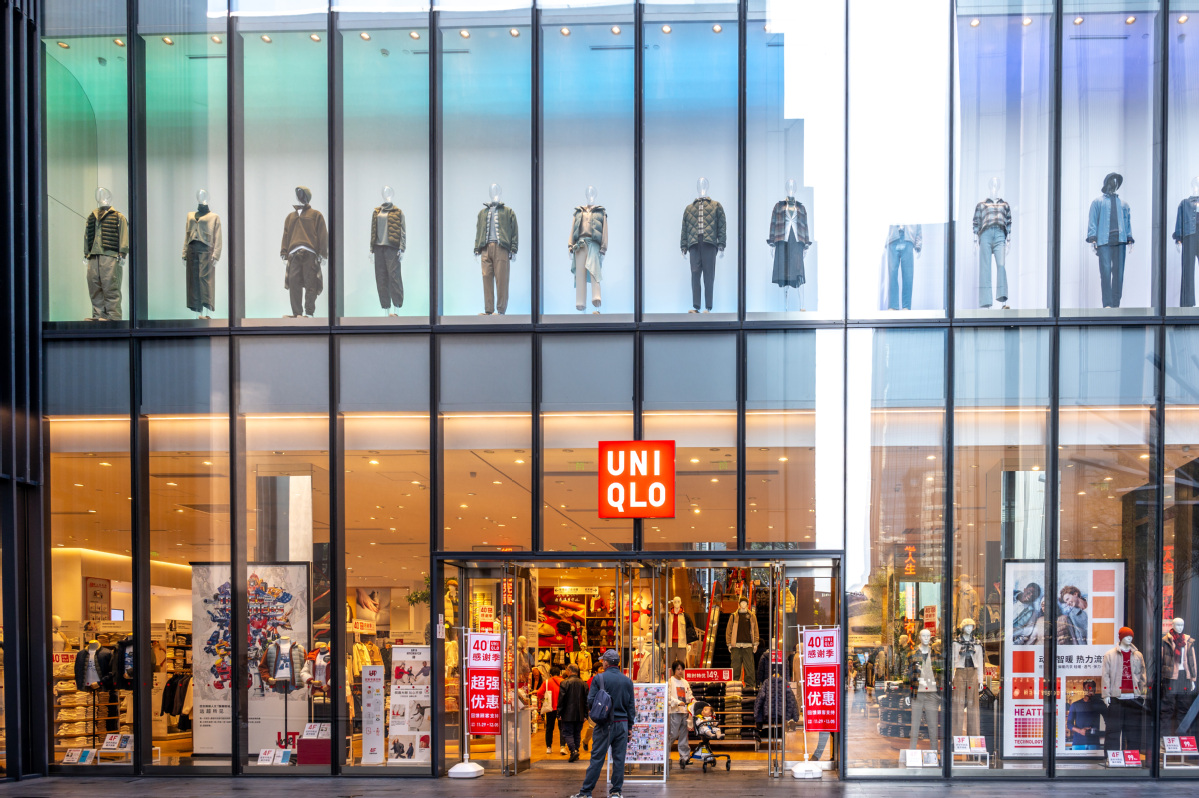Uniqlo to modify store opening strategy in China
Company to accelerate integration of brick-and-mortar, e-commerce business
By ZHONG NAN | China Daily | Updated: 2024-12-23 10:04

Driven by China's evolving market demand, Uniqlo, the Japanese apparel retailer owned by Fast Retailing Co Ltd, will shift its store opening strategy by replacing smaller, less profitable outlets with larger, premium locations across China in the coming years, said its senior executives.
The Japanese company also plans to further integrate its brick-and-mortar and e-commerce operations, fostering greater collaboration between the two while exploring new sales channels, such as livestreaming, to drive growth.
Due to increased customer capacity and broader product offerings, operating large stores can generate higher revenues, said Pan Ning, CEO of Uniqlo China.
Evolving Chinese consumers, especially in urban areas, demand high-quality shopping experiences, which larger, premium stores can deliver, said Pan, adding this shift not only aligns with changing consumer behavior, but also positions Uniqlo to capitalize on China's market growth while ensuring sustainable and long-term profitability.
Benefiting from China's open and inclusive business environment and innovative atmosphere, Uniqlo has established over 920 directly operated stores across more than 200 cities in the country to date, creating over 1 million jobs throughout the entire industrial chain.
"While leveraging the advantages of store network development in China, we will fully implement individual store operations to put our business in China back on a high-growth trajectory in the next step. This includes adjusting product assortments based on regional differences, climate and culture," he added.
Uniqlo's sales revenue in China surged 9.2 percent year-on-year to 677 billion Japanese yen ($4.4 billion) in its 2024 fiscal year, according to the company's latest financial report.
To further deepen its localization strategy, Guo Bin, creative director of Uniqlo China, noted that Uniqlo has introduced 18 co-branded collections featuring local cultural elements in collaboration with various artists since 2021.
These collections blend art, life and cultural sentiment through a modern and playful lens, fostering local creativity while preserving and revitalizing cultural traditions.
One standout initiative is the "City Fun" series, showcasing whimsical designs inspired by cities such as Beijing, Shanghai, Chongqing and Xi'an in Shaanxi province.
"The series incorporates iconic elements like Beijing opera masks, hot pot and pandas, highlighting city identities and cultivating a sense of belonging among consumers," said Guo. "This initiative offers locals a fresh and engaging cultural co-creation experience."
As China's consumption-driven economic transformation continues to accelerate, platforms like the China International Import Expo have become essential gateways for multinational corporations to showcase their latest products and technologies, Guo said.
Uniqlo has unveiled over 10 debut products, including down jackets and dresses, during its participation in five editions of the CIIE held in Shanghai.
"The Chinese market holds a pivotal position in our global business strategy. As the second-largest economy in the world, China offers immense potential and innovative capabilities, presenting us with numerous opportunities for growth," he added.
Guan Lixin, a researcher specializing in marketing at the Chinese Academy of International Trade and Economic Cooperation in Beijing, said that young Chinese consumers have a strong preference for traveling, value individuality and seek diverse ways to match their lifestyles. Most importantly, they cherish their cultural identity and are eager to express it.
This shift, Guan explained, will drive a range of evolving needs, triggering a series of consumer trends and innovative advancements. It will also compel retailers to become more attuned and responsive to consumer demands.
"China's recent introduction of a potent stimulus policy package, including dedicated efforts to shore up consumer spending, will provide massive opportunities for global businesses keen to tap into its super-sized market and facilitate the transition toward a consumption-led growth model," she added.
Consumption has remained the primary driving force for China's economic development as the growth in consumption contributed 49.9 percent to GDP growth in the first three quarters of 2024, said Ministry of Commerce.
Eager to expand its sales, Uniqlo opened a new global flagship store in Shinjuku, Tokyo, in late October. Located in an area bustling with customers from Japan and other countries, such as China, South Korea and the United States, the store offers an extensive product lineup.
It also offers special products developed in collaboration with long-established companies and shops from Shinjuku, as well as flower and coffee outlets.
























